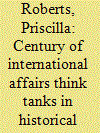| Srl | Item |
| 1 |
ID:
142219


|
|
|
|
|
| Summary/Abstract |
This essay surveys the operations of foreign policy think tanks, and how they have functioned to create transnational knowledge networks, since their emergence in the early twentieth century, around the First World War. It discusses how patterns of linkages among foreign policy think tanks changed and evolved over time, and were linked to broader Anglo-American, imperial, and internationalist networks and relationships, and to the changing international political climate and configuration. It suggests some ways in which think tanks contributed to Cold War interchanges between different states, especially to Soviet bloc–Western relations and Asian–Western relations. It concludes by discussing the recent proliferation and frequent globalization of foreign policy think tanks, and suggests how such trends may develop in future.
|
|
|
|
|
|
|
|
|
|
|
|
|
|
|
|
| 2 |
ID:
188881


|
|
|
|
|
| Summary/Abstract |
The United States’ long-standing approach to the People’s Republic of China—“engagement”—is at an end, replaced by a tougher approach, labeled “strategic competition.” Foregrounding the role of knowledge communities in the making of US foreign policy, I show that engagement’s demise followed less a rational process responding to shifts in Chinese behavior and the balance of power, and more a paradigmatic turnover in key individuals’ views of China within the government and the China expert community. Adopting a sociological perspective attuned to the social and professional underpinnings of US foreign policy, I trace the paradigmatic turnover in US views of China to three processes: politicization, professional status competition, and personalization. Drawing on a range of sources, including over one hundred original interviews with members of the US China expert community, this article traces the entanglement of engagement at once political, professional, and deeply personal.
|
|
|
|
|
|
|
|
|
|
|
|
|
|
|
|